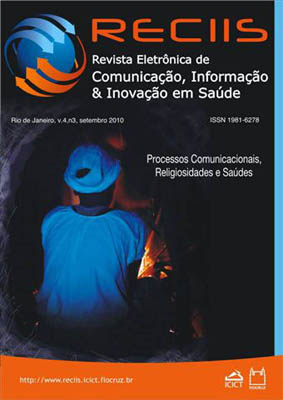Umbanda in the Kardecist Spiritualist Novels
DOI:
https://doi.org/10.3395/reciis.v4i3.663Keywords:
religion, Umbanda, Kardecism, interpretative anthropology, novelsAbstract
n anthropology, religion can be seen as a cultural system that encompasses a whole range of symbols and signification, where meaning relations regarding life are built; as stated by Geertz, religion produces an ethos and a worldview. This study aimed to analyze Umbanda (a Brazilian spiritualist religion) as it appears in spiritist novels, in search of moral and cognitive aspects that inform them, in this case, seeking the spiritist view of Umbanda, positivity or negativity attributed to it and the arguments which were used to justify such ratings. The chosen texts allowed the examination between descriptions and excerpts from these novels and descriptions and excerpts with reference to Umbanda produced by the academic literature. This strategy allowed us to deepen our analysis and, going a little beyond the novels, to introduce a more critical consideration. With the purpose of reading and analyzing the texts, we previously set some markers: birth of Umbanda, obsession or encosto (a discarnate to incarnate relation that works as a jinx); syncretism; and health-disease process. The explicability offered by Spiritualism shows all its strength to those going through mishaps (death, loss, illness, etc.); and descriptions of Umbanda performances and Spiritism are also seen in this context as a sum of individual actions in benefit of the incarnated and discarnated individuals.Downloads
How to Cite
Issue
Section
License
Author’s rights: The author retains unrestricted rights over his work.
Rights to reuse: Reciis adopts the Creative Commons License, CC BY-NC non-commercial attribution according to the Policy on Open Access to Knowledge by Oswaldo Cruz Foundation. With this license, access, download, copy, print, share, reuse, and distribution of articles is allowed, provided that it is for non-commercial use and with source citation, granting proper authorship credits and reference to Reciis. In such cases, no permission is required from the authors or editors.
Rights of authors’s deposit / self-archiving: The authors are encouraged to deposit the published version, along with the link of their article in Reciis, in institutional repositories.












